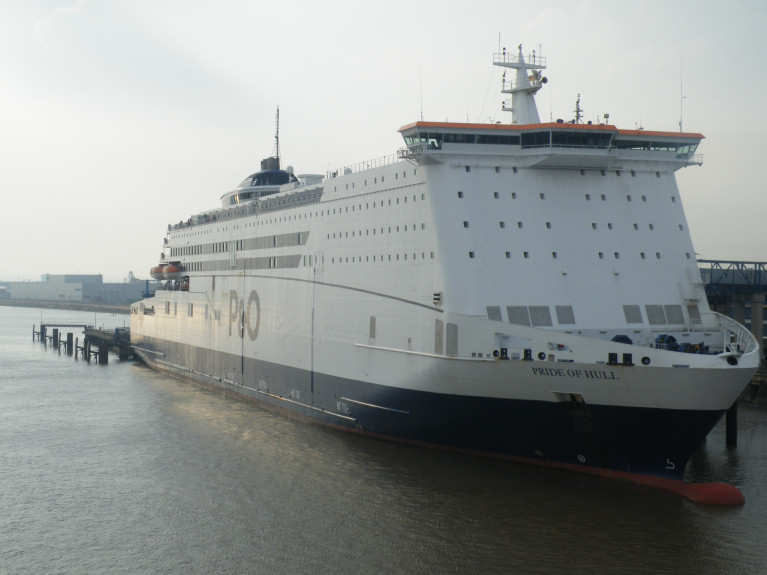Displaying items by tag: Labour Party
UK Shadow Secretary Visits Harland & Wolff As Labour Party Announce Government Ships to Be Built Across UK If Elected
A visit to Harland & Wolff Group’s Belfast shipyard took place recently by the UK Shadow Secretary of State for Northern Ireland, Hilary Benn MP.
The visit according to Harland & Wolff came on the same day that the Shadow Chancellor Rachel Reevess MP, announced a Labour Party commitment to build all government vessels at shipyards across the UK should the party form a future administration.
Mr Benn toured the shipyard and saw the extensive civil works underway as part of a £77m upgrade of yard infrastructure and technology to deliver three Royal Fleet Auxiliary (RFA) Fleet Solid Support (FSS) ships.
Harland & Wolff is part of Team Resolute, in a consortium including BMT and Navantia UK, part of the Spanish state-owned shipbuilding group which won the £1.6 billion contract.
The three FSS / replenishment vessels have been ordered by the UK Ministry of Defence for the RFA which will serve the operational requirements of the British Royal Navy.
The shipyard on Queens Island has been upgraded to adopt state-of-the-art shipbuilding techniques which will underpin Harland & Wolff’s capacity to deliver key naval programmes of FSS and beyond.
Over the course of the FSS contract, at its peak, Harland & Wolff is expected to employ 1,200 personnel in Belfast and at their Appledore shipyard, in north Devon, England with an expected additional 800 plus jobs across the UK supply chain.
In addition to cutting edge automation and robotic machinery capabilities, the improvements include a 5,000m2 extension to the existing fabrication halls. This will facilitate up to 16m2 of automated fabrication panels.
Labour Party in UK to Force Emergency Vote on Ferry Workers' Rights following P&O Sackings
In the House of Commons, Labour will force an emergency vote to demand the government takes action to outlaw so-called fire and rehire of ferry crew after 800 plus P&O workers (incl. Irish personnel) were sacked on the spot.
The party said reports suggest the government was aware of the sackings before they were announced, as well as the plan to use "exploitative" practices to take on cheaper employees.
The Rail, Maritime and Transport union has claimed replacement crews are being paid less than minimum wage.
'A line in the sand'
Louise Haigh, the shadow transport secretary, described the sackings as "a line in the sand" ahead of the vote in parliament on Monday.
Labour will call on the government to suspend contracts with P&O owners DP World until the matter is resolved and to remove it from its Transport Advisory Group.
Sky News has more on the ferry crewing dispute that has focused attention at Westminster.
Labour Manifesto Leads the Way on Irish Maritime Affairs
Fine Gael has told Afloat.ie details of its marine policy will be published in its manifesto tomorrow. If that's the case things are looking up for anyone interested in seeing Ireland develop the valuable waters that surround it.
After searching for references to 'sea', 'marine' or 'maritime' only the Labour party has so far made the only significant written commitment to the marine sector in its programme for government. Its manifesto acknowledges that Coastal Communities, Fisheries and the Marine face major challenges in the years ahead, but it is also an area of major economic potential.
Fianna Fail merely says on page 21 of its manifesto that it will ensure that 'an inter-departmental strategy is in place to improve the leisure potential of our harbours and increase marine tourism'.
The Green Party 'Renewing Ireland' document says it will promote the creation of marinas and youth and child friendly water sports to encourage activity and awareness of our maritime country. It also says Ireland will participates in the North Seas Offshore Grid Plan.
There is no reference to the marine in the Sinn Fein 'There is a Better Way' manifesto.
Four party manifestos are available to download below.
Labour's priority will be to develop Ireland as a European hub for seafood processing, which will create sustainable, value-added jobs in coastal communities.
Labour will also develop an Irish seafood strategy to grow the market profile and demand for Irish seafood products. We will support the development of sustainable aquaculture and fish farms by streamlining the licensing process and reducing, as much as possible, the associated bureaucracy. To further assist the development of the sector, responsibility for maritime policy will, as far as is practicable, be concentrated in one department.
Labour will establish a Sea Fisheries Sustainability Impact Assessment based on consultation with all major stakeholders. This report will be brought before the Dáil on an annual basis before EU fisheries negotiations commence, and will ensure that there is a regular evaluation of Irish fish stocks and the effectiveness of current policy and quotas.
Labour is open to the experience and expertise of those whose livelihoods depend on maritime activity. The Department of Agriculture, Fisheries and Food will engage in an ongoing structured consultation with industry representatives, the marine scientific community and other stakeholders to enable them to contribute to national maritime policy.
Finally, safety at sea and decent working conditions must underpin the development of the fisheries sector. Labour in government will ensure that the Irish Coast Guard has access to an Emergency Towing Vessel.
Dun Laoghaire People before Profit candidate Richard Boyd Barrett who has campaigned under a 'Save our Seafront' banner in the last council elections, is holding a meeting tomorrow night in Dun Laoghaire, the country's largest boating centre to protest against the possible 'privatisation' of the town's harbour.
We're tracking the progress of maritime affairs in the general election and posting details on afloat.ie. Whether you're a candidate or a vote please get in touch with your #ge11 marine news. Contact us via facebook, twitter or our website.

























































